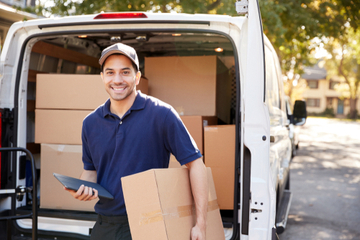Starting Work as a Delivery Van Driver
- Details
- Created: 17 August 2021
 The COVID-19 pandemic has had a deep-seated affect on all our lives, in so many ways. And for many, it meant the loss of their job. If you are now considering becoming a van driver, our guide can help you understand some of the details about the job.
The COVID-19 pandemic has had a deep-seated affect on all our lives, in so many ways. And for many, it meant the loss of their job. If you are now considering becoming a van driver, our guide can help you understand some of the details about the job.
Can anyone become a van driver?
You will probably need to be at least 18 years old; older van drivers, with more road experience, are more likely to get cheaper van insurance. And, you will need to be physically fit as delivery drivers have to lift and carry packages and boxes to and from their van.
To be a delivery van driver you will need a good level of English, both written and spoken, and you will need to have a good driving record with the appropriate driving licence for the role you are taking on.
You will also need some basic maths ability and good organisational skills. If you have any experience of the logistics industry, warehouse work or any other driving jobs then these will be useful when applying for delivery van driver roles.
What type of van can I drive?
Those who passed their car driving test before 1 January 1997 are allowed to drive vehicles up to 7.5 tonnes without the need for a separate licence.
If your car driving licence was issued after 1 January 1997, you can drive vehicles up to 3.5 tonnes. You will require further training to get a category C1 licence which allows you to drive vehicles from 3.5 tonnes to 7.5 tonnes (fully loaded weights).
Many of the most common types of van for delivery purposes are under 3.5 tonnes, such as the Ford Transit, Vauxhall Movano, Renault Master, Fiat Ducato, Peugeot Boxer and Citroen Relay. Some box vans, such as the Luton box van, are also available in this category.
Larger vans, up to 7.5 tonnes, are typically cargo vans, such as the Iveco Eurocargo, Isuzu Curtainsiders, Renault Midlum and Mitsubishi Fuso Canter.
Will I need to provide van insurance?
This will depend on the type of role you take on. For instance, if you start working for a large company, such as Royal Mail, they will have their own fleet of vans and their own fleet van insurance. Smaller firms may still have their own vans and use any driver van insurance to cover their commercial vehicles.
However, some delivery companies will require you to be an owner-driver on a self-employed basis. You may be able to use a car for this type of role, but having a van means you can carry more packages and do longer routes.
You will need to make sure you have the right type of van insurance and if you intend to let someone else use your vehicle, you will need any driver van insurance.
Where is the best place to get cheap van insurance?
If you're thinking of using your own van to start work as a delivery driver, you're already in the right place for great deals on van insurance.
iVan insurance can help you find the van insurance quotes to suit you. You could be covered in minutes and have all your policy documents ready to go today.
Get a van insurance quote now with iVan.
Related Articles








